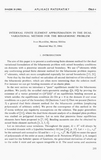Article
MSC:
31A30,
35J40,
49D25,
65E05,
65N30,
73K25 | MR 0795986 | Zbl 0584.65068 | DOI: 10.21136/AM.1985.104149
Full entry |
 PDF
(2.3 MB)
Feedback
PDF
(2.3 MB)
Feedback
 PDF
(2.3 MB)
Feedback
PDF
(2.3 MB)
Feedback
Keywords:
conforming finite element method; dual variational formulation; biharmonic problem; mixed boundary conditions
conforming finite element method; dual variational formulation; biharmonic problem; mixed boundary conditions
Summary:
A conformal finite element method is investigated for a dual variational formulation of the biharmonic problem with mixed boundary conditions on domains with piecewise smooth curved boundary. Thus in the problem of elastic plate the bending moments are calculated directly. For the construction of finite elements a vector potential is used together with $C^0$-elements. The convergence of the method is proved and an algorithm described.
References:
[1] F. Brezzi: Non-standard finite elements for fourth order elliptic problems. Energy Methods in Finite Element Analysis. John Wiley&Sons Ltd., Chichester, New York, Brisbane, Toronto, 1979, 193-211. MR 0537006
[2] F. Brezzi P. A. Raviart: Mixed finite element methods for 4th order elliptic equations. Topics in Numerical Analysis, vol. III, Academic Press, London, 1976, 33 - 36. MR 0657975
[3] P. G. Ciarlet: The finite element method for elliptic problems. North-Holland, Amsterdam, New York, Oxford, 1978. MR 0520174 | Zbl 0383.65058
[4] P. G. Ciarlet R. Glowinski: Dual iterative techniques for solving a finite element approximation of the biharmonic equation. Comput. Methods Appl. Mech. Engrg. 5 (1975), 277-295. DOI 10.1016/0045-7825(75)90002-X | MR 0373321
[5] P. Doktor: On the density of smooth functions in certain subspaces of Sobolev spaces. Comment. Math. Univ. Carolin. 14, 4 (1973), 609-622. MR 0336317
[6] B. Fraeijs de Veubeke: Finite element method in aerospace engineering problems. Computing Methods in Applied Sciences and Engineering. Part 1, Springer- Verlag, Berlin, Heidelberg, New York, 1974, 224-258.
[7] B. Fraeijs de Veubeke G. Sander: An equilibrium model for plate bending. Int. J. Solids and Structures 4 (1968), 447-468. DOI 10.1016/0020-7683(68)90049-8
[8] I. Hlaváček: Convergence of an equilibrium finite element model for plane elastostatics. Apl. Mat. 24 (1979), 427-457. MR 0547046
[9] I. Hlaváček M. Křížek: Internal finite element approximations in the dual variational method for second order elliptic problems with curved boundaries. Apl. Mat. 29 (1984), 52-69. MR 0729953
[10] J. Hřebíček: Numerical analysis of the general biharmonic problem by the finite element method. Apl. Mat. 27 (1982), 352-374. MR 0674981
[11] M. Křížek: Conforming equilibrium finite element methods for some elliptic plane problems. RAIRO Anal. Numer. 17 (1983), 35-65. DOI 10.1051/m2an/1983170100351 | MR 0695451
[12] L. A. Ljusternik V. I. Sobolev: A short course of functional analysis. (Russian). Izd. Vysšaja škola, Moscow, 1982.
[13] L. Mansfield: A Clough-Tocher type element useful for fourth order problems over nonpolygonal domains. Math. Соmр. 32 (1978), 135-142. MR 0468241 | Zbl 0382.65060
[14] S. G. Michlin: Variational methods in mathematical physics. (Russian). Izd. Nauka, Moscow, 1970.
[15] J. Nečas: Les méthodes directes en théorie des équations elliptiques. Academia, Prague, 1967. MR 0227584
[16] J. Nečas I. Hlaváček: Mathematical theory of elastic and elasto-plastic bodies: an introduction. Elsevier, Amsterdam, Oxford, New York, 1981. MR 0600655
[17] K. Rektorys: Survey of applicable mathematics. Iliffe Books Ltd., London, SNTL, Prague, 1969. MR 0241025 | Zbl 0175.15802
[18] K. Rektorys: Variational methods in mathematics, science and engineering. D. Reidel Publishing Co., Dordrecht-Boston, Mass., 1977. MR 0487653
[19] G. Sander: Application of the dual analysis principle. Proc. of the IUTAM Sympos. on High Speed Computing of Elastic Structures, Congrès et Colloques de l'Université de Liège, 1971, 167-207.
[20] M. Zlámal: Curved elements in the finite element method. SIAM J. Numer. Anal. 10 (3973), 229-240. DOI 10.1137/0710022 | MR 0395263
[21] A. Ženíšek: Curved triangular finite $C^m$-elements. Apl. Mat. 23 (1978), 346-377. MR 0502072

